Thomas James Richards, Diaries, Transcript Vol. 1, 26 August 1914 to 24 April 1915 - Part 14
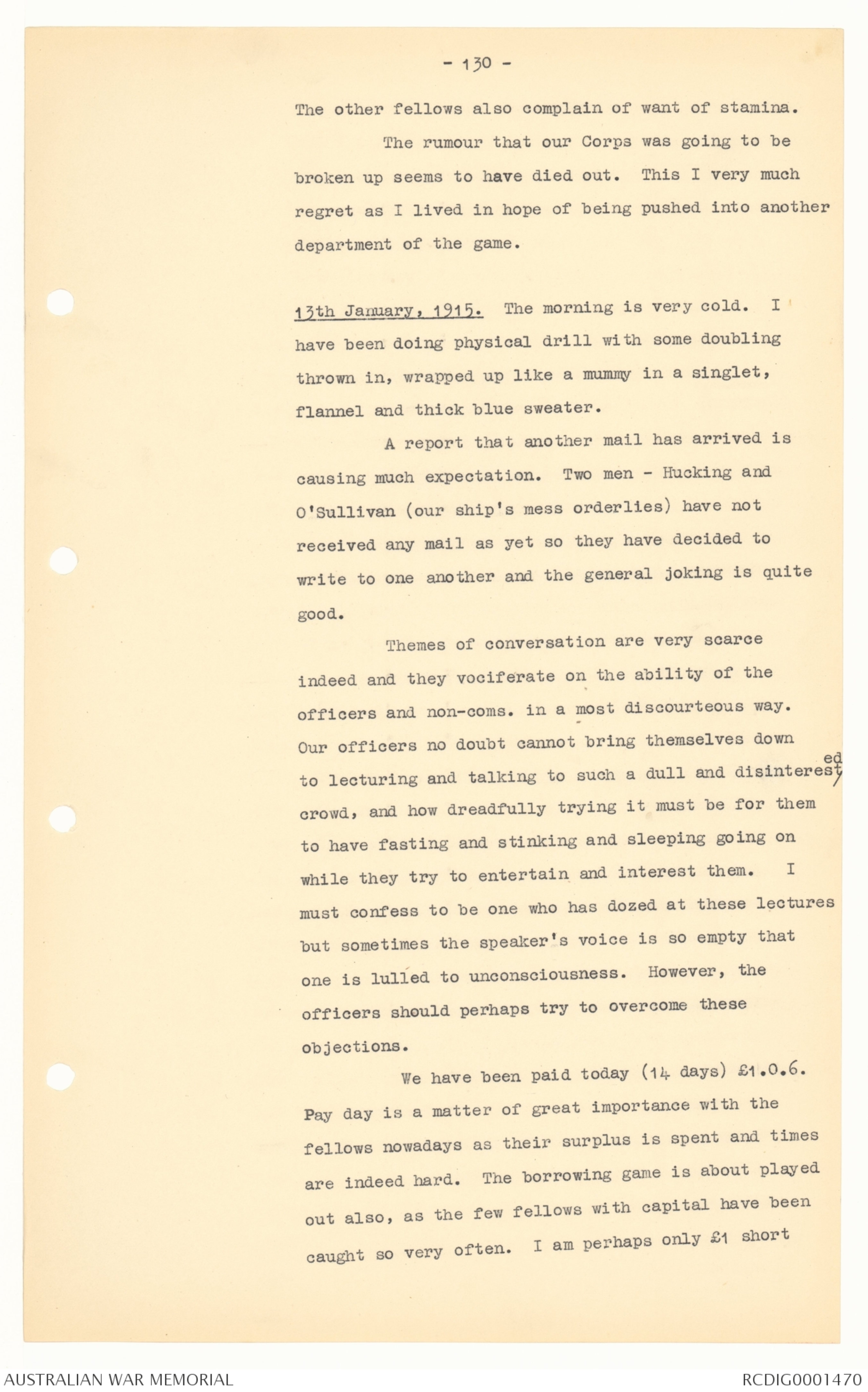
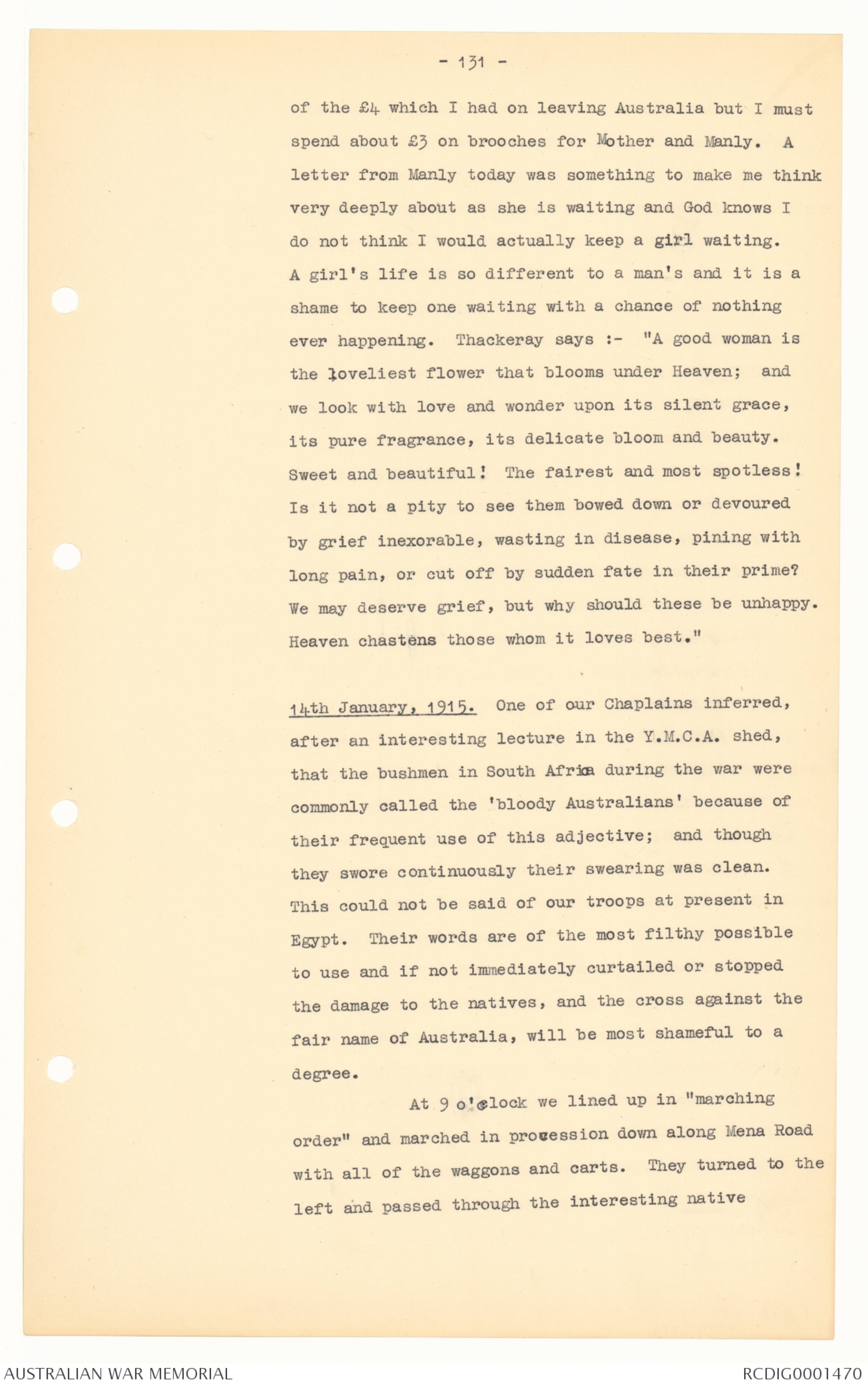
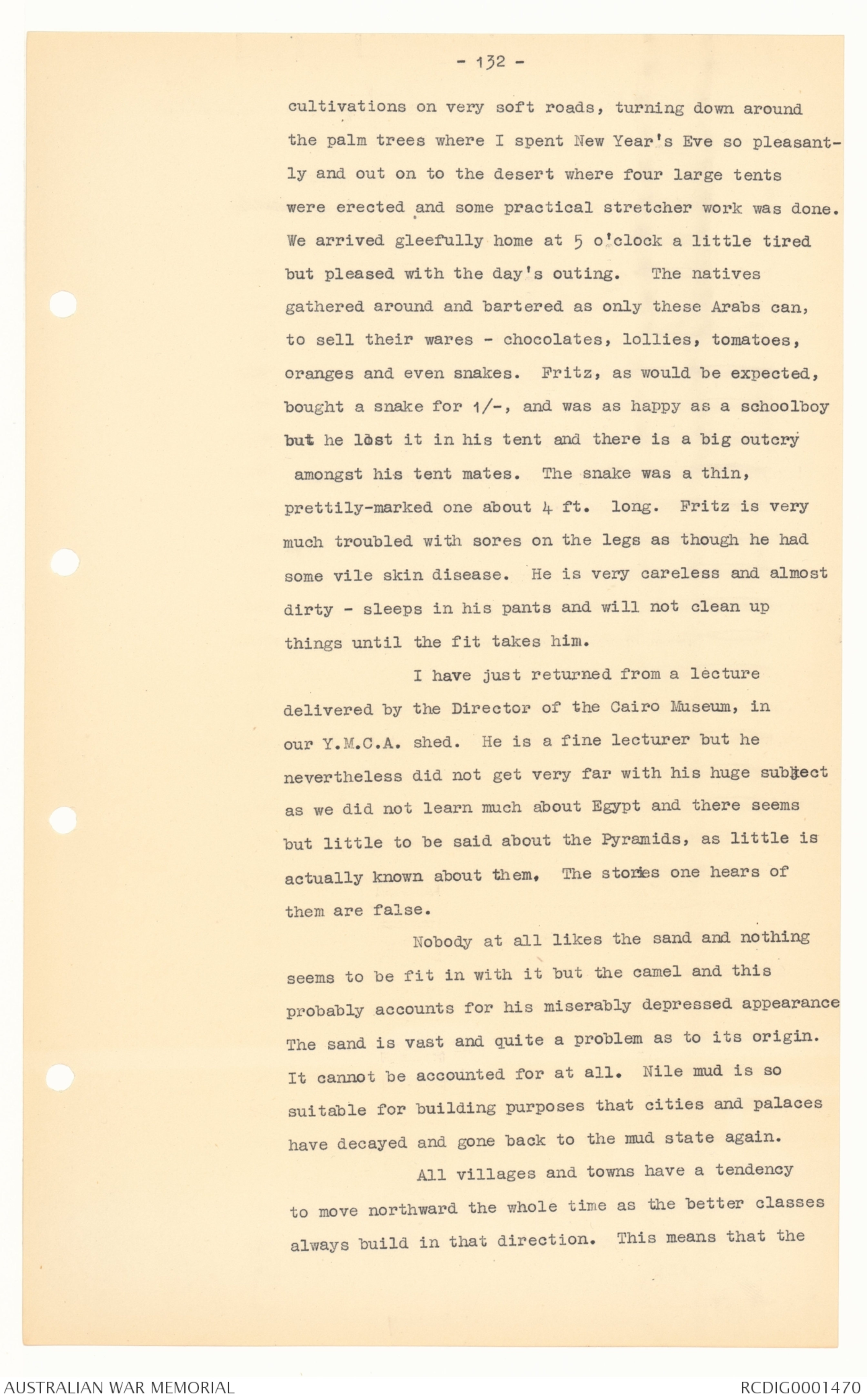
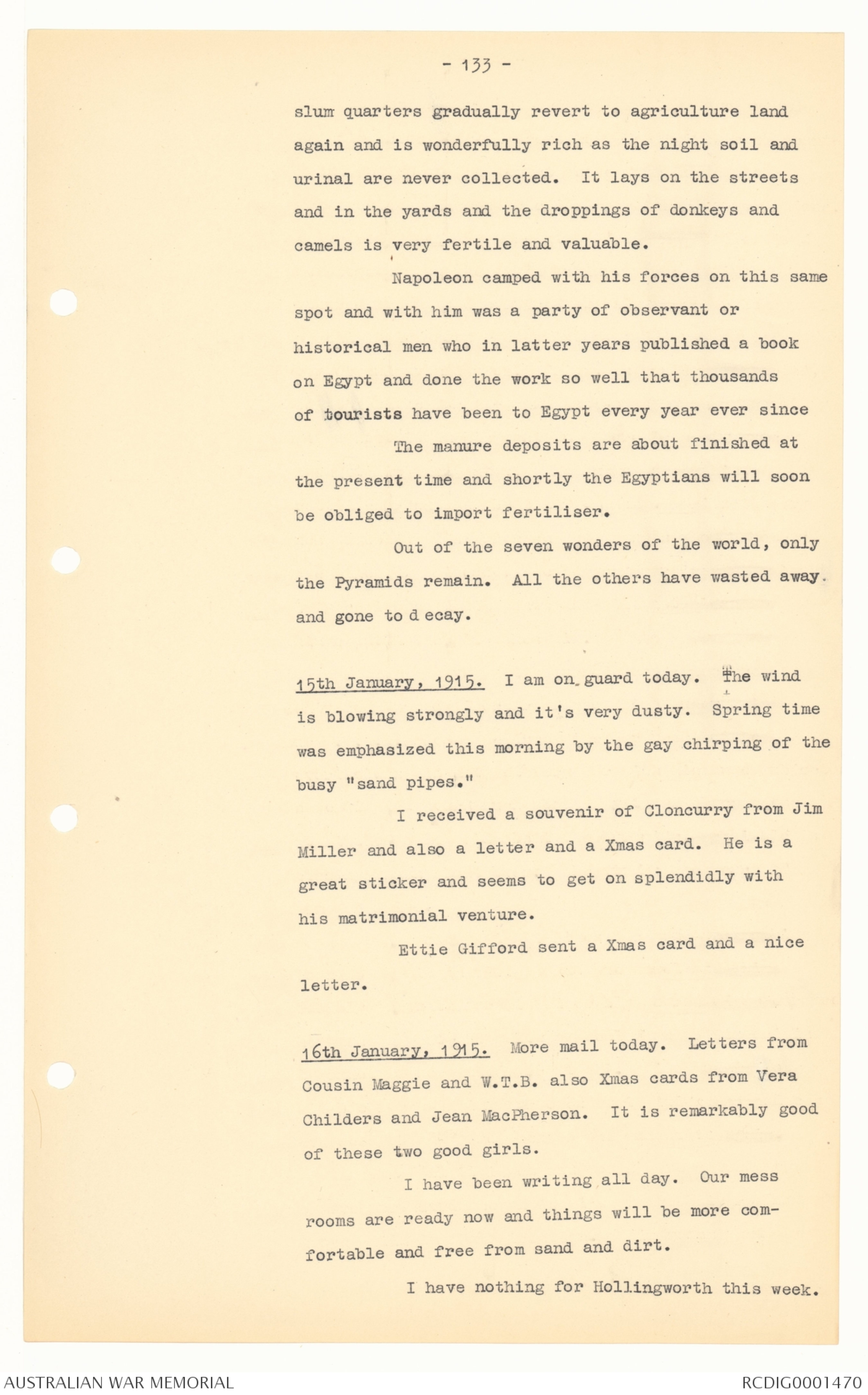
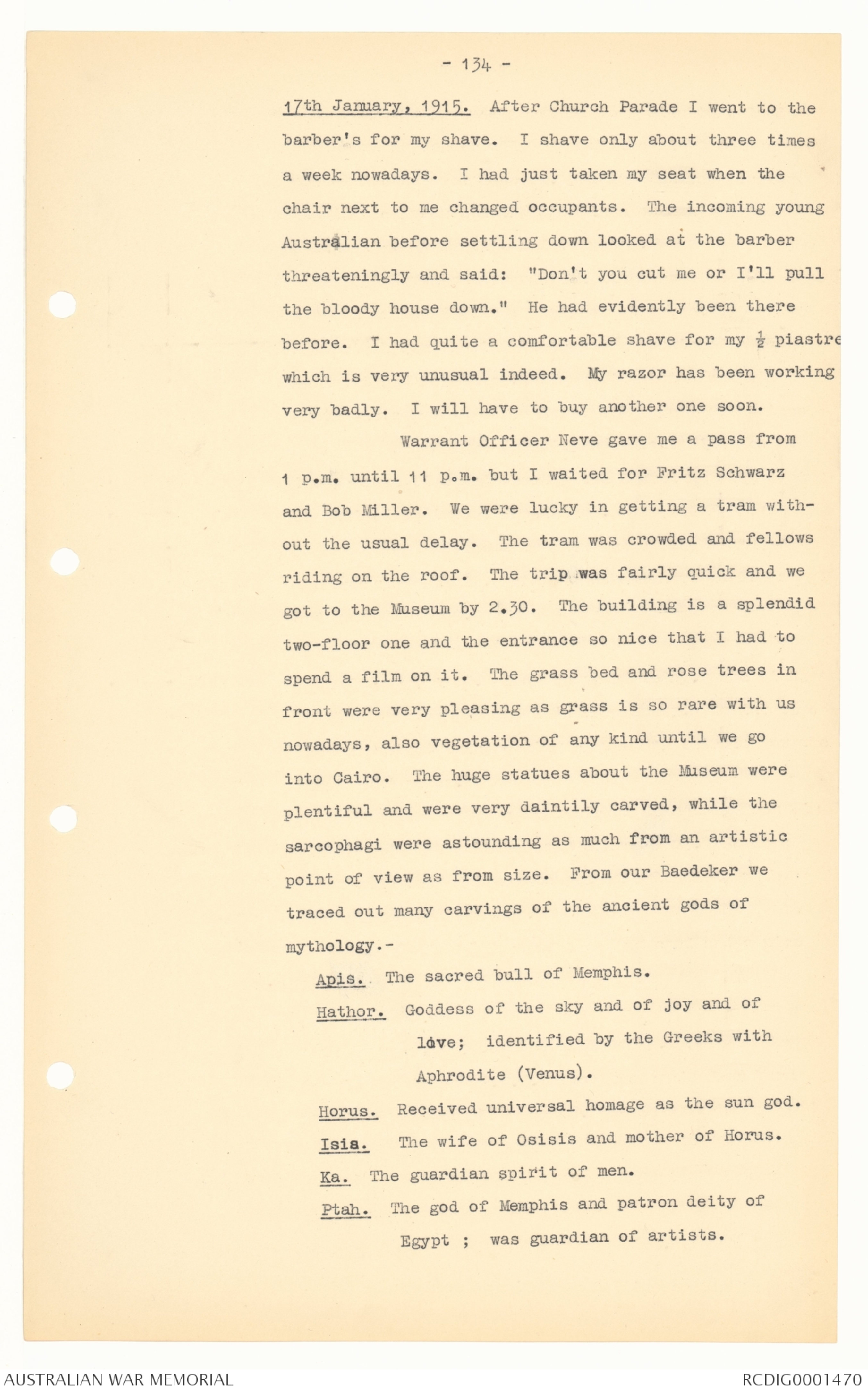
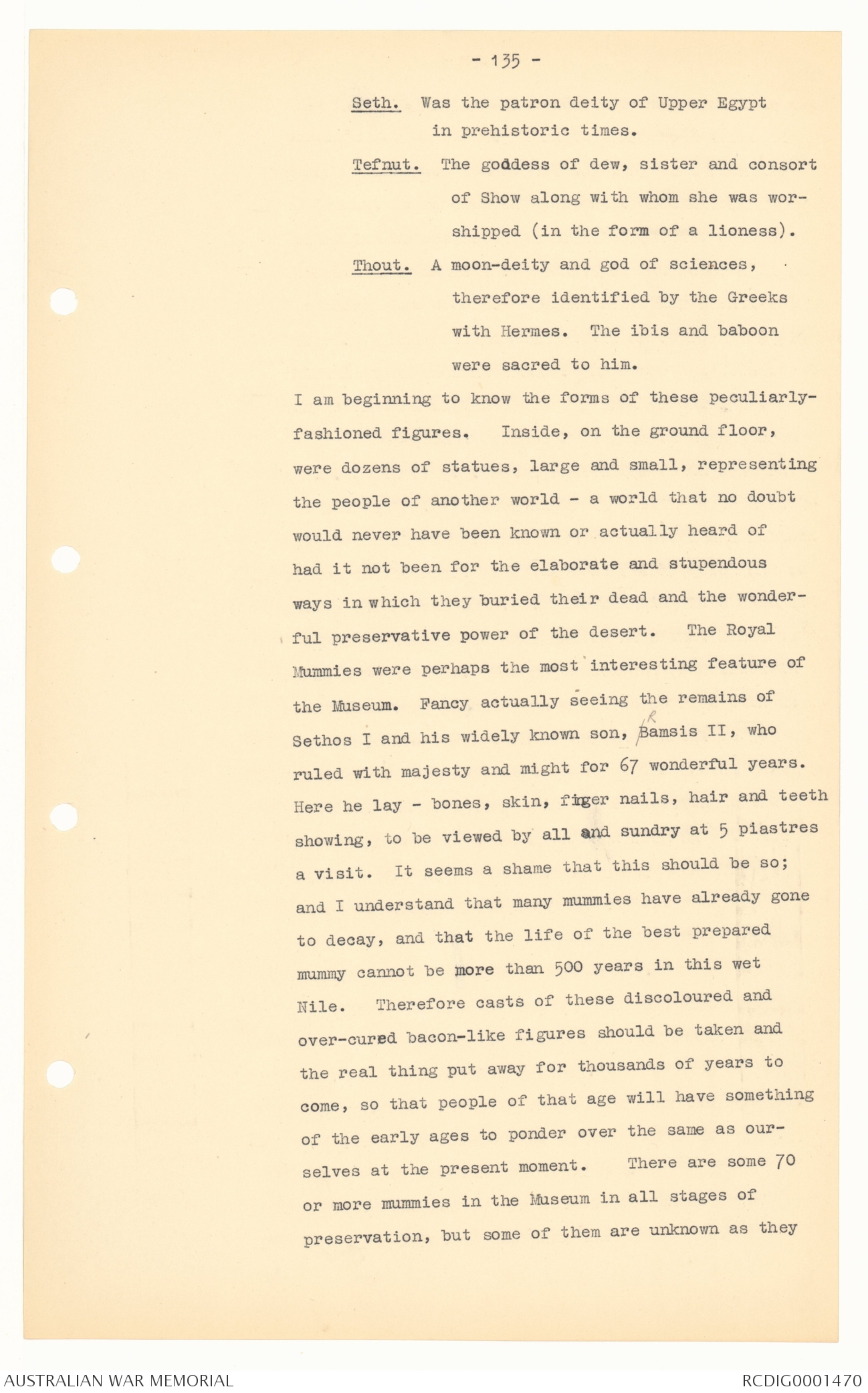
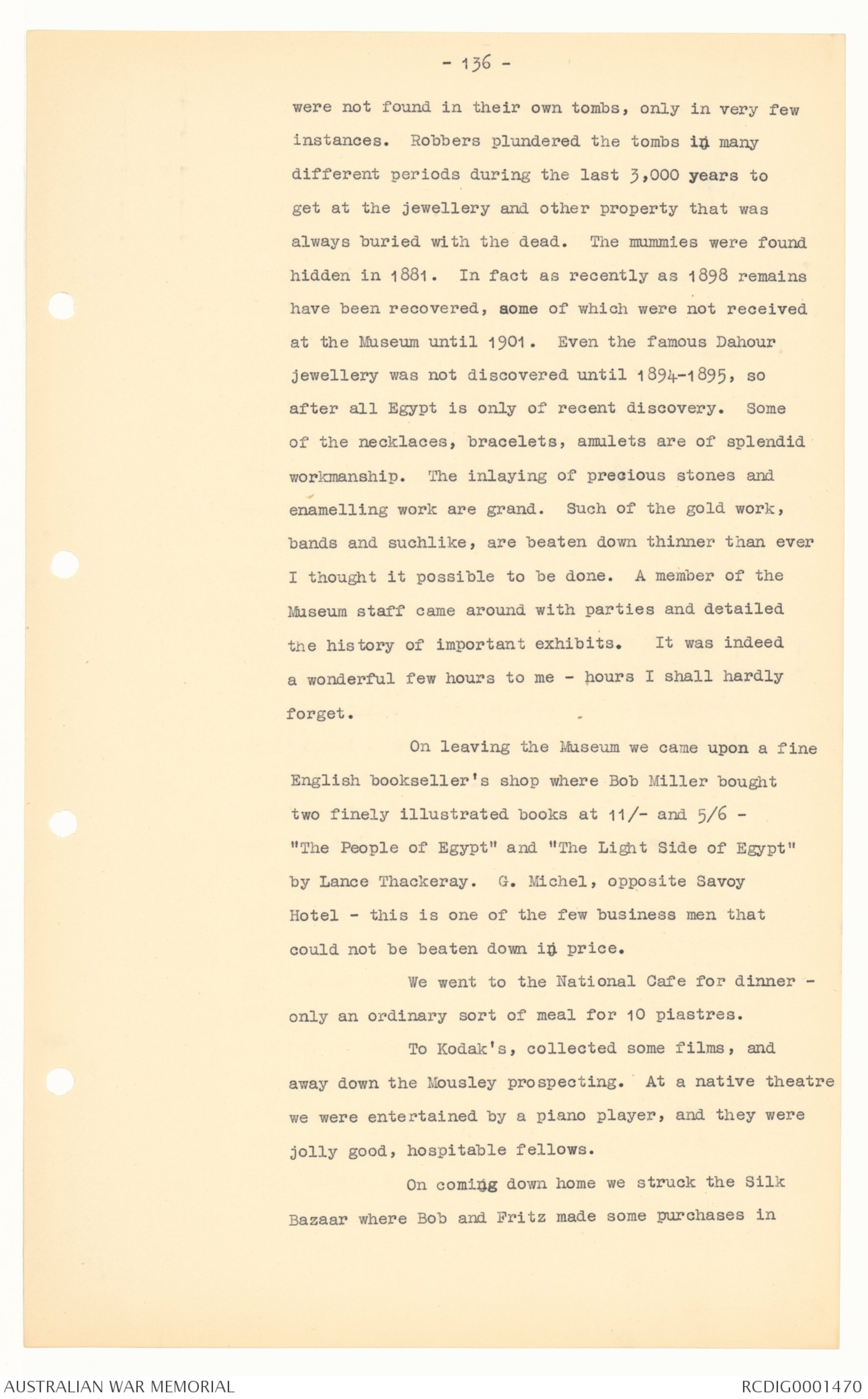
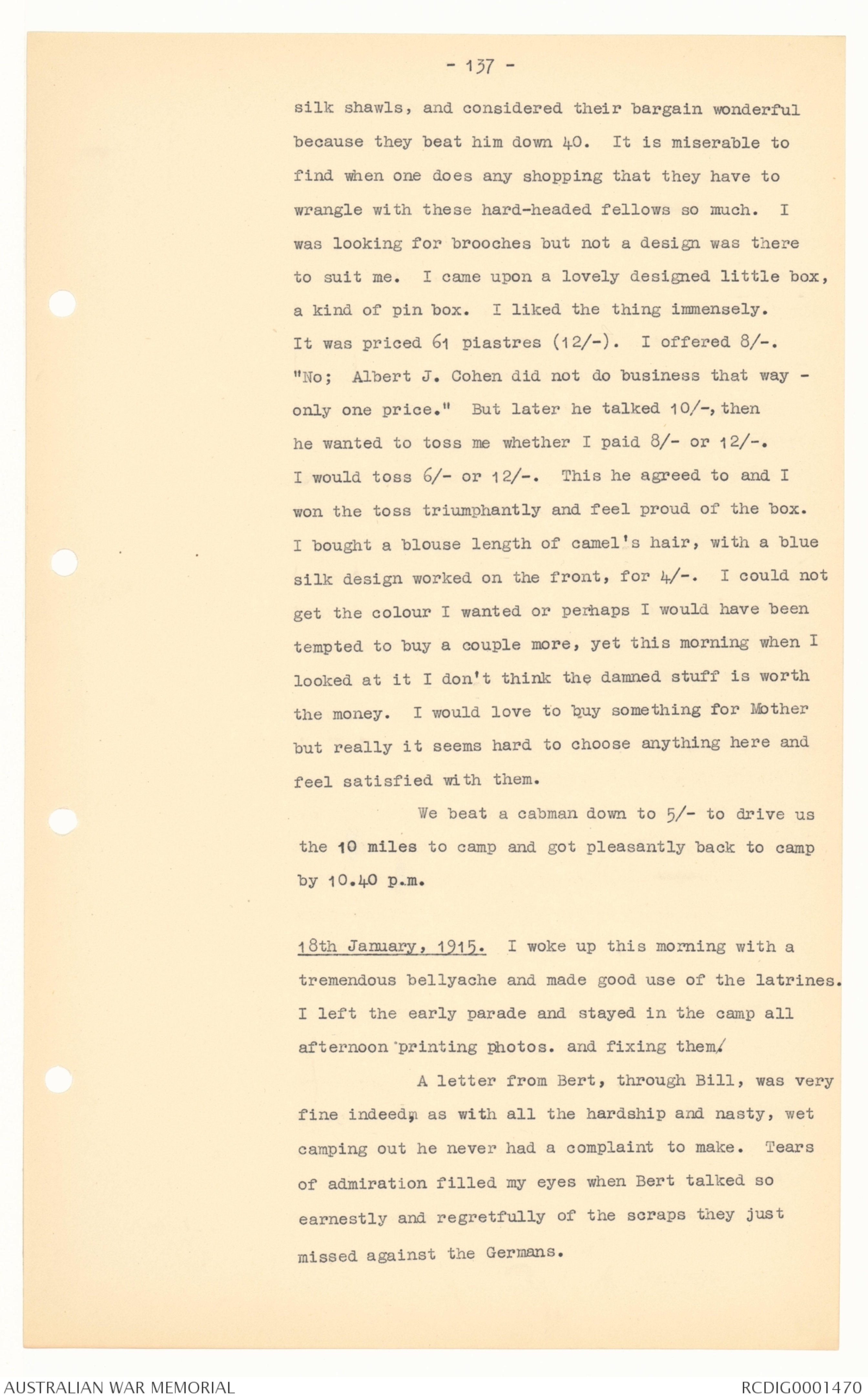
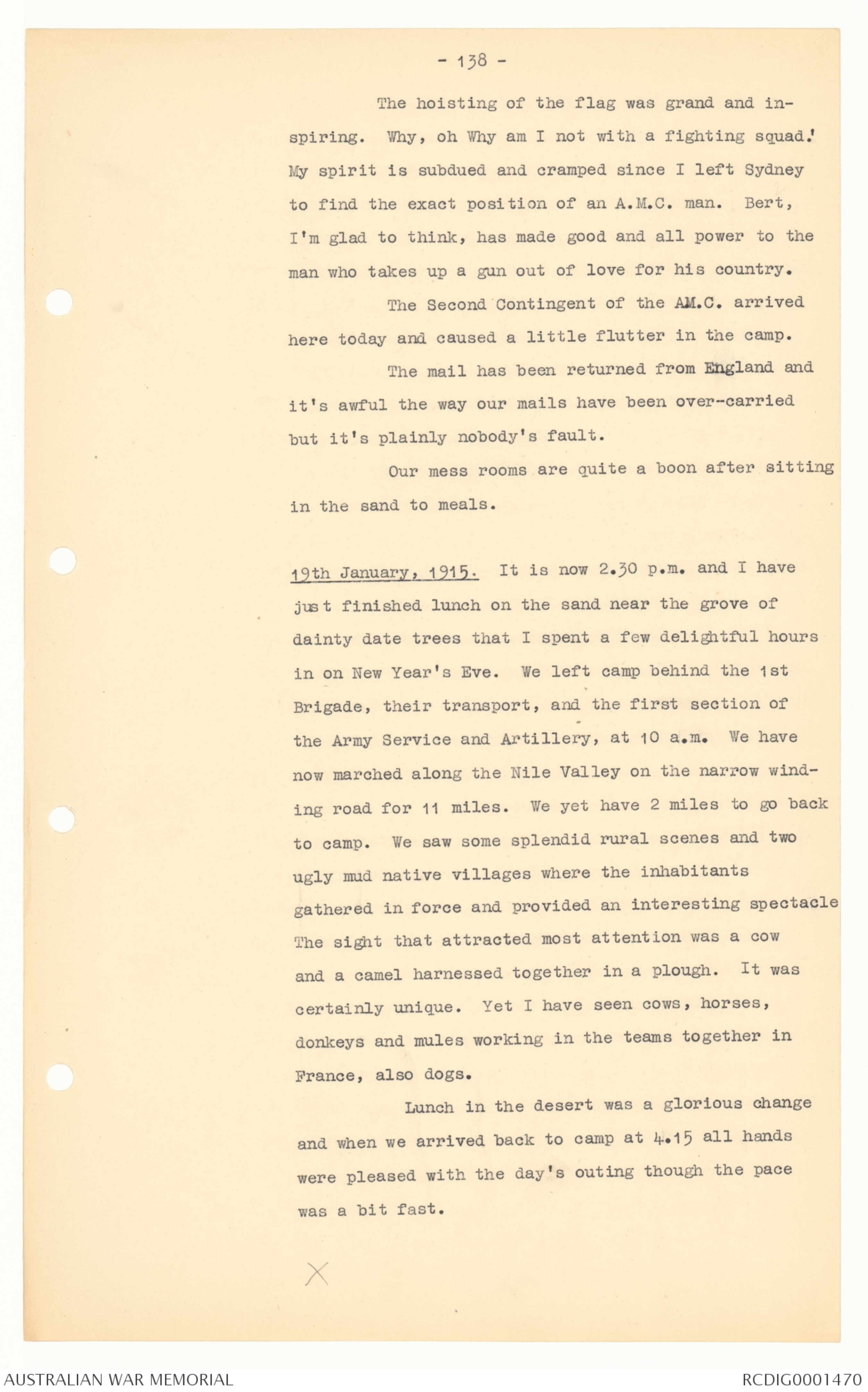
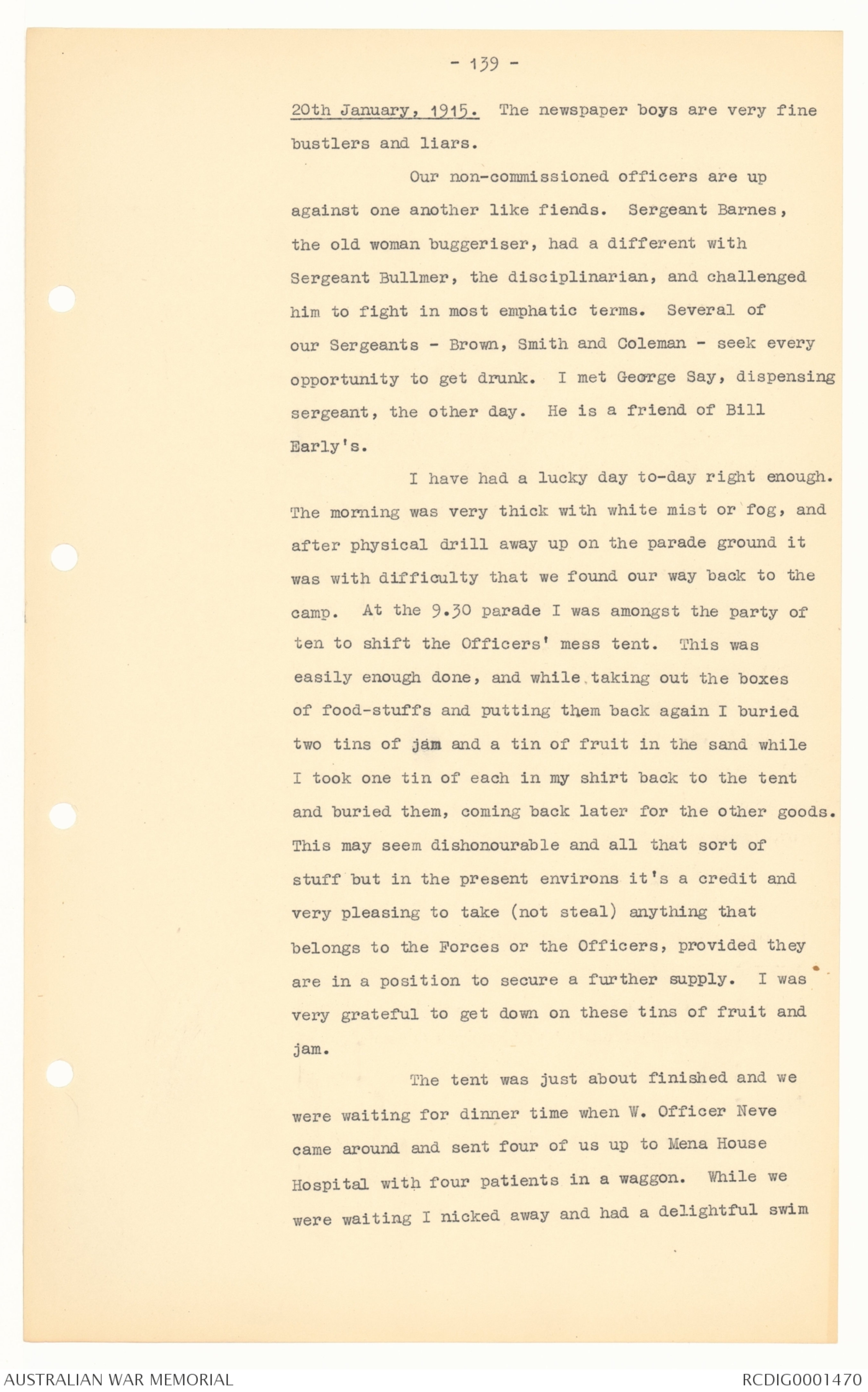
-130 -
The other fellows also complain of want of stamina.
The rumour that our Corps was going to be
broken up seems to have died out. This I very much
regret as I lived in hope of being pushed into another
department of the game.
13th January, 1915. The morning is very cold. I
have been doing physical drill with some doubling
thrown in, wrapped up like a mummy in a singlet,
flannel and thick blue sweater.
A report that another mail has arrived is
causing much expectation. Two men - Hucking and
O'Sullivan (our ship's mess orderlies) have not
received any mail as yet so they have decided to
write to one another and the general joking is quite
good.
Themes of conversation are very scarce
indeed and they vociferate on the ability of the
officers and non-coms, in a most discourteous way.
Our officers no doubt cannot bring themselves down
to lecturing and talking to such a dull and disinterest
crowd, and how dreadfully trying it must be for them
to have fasting and stinking and sleeping going on
while they try to entertain and interest them. I
must confess to be one who has dozed at these lectures
but sometimes the speaker's voice is so empty that
one is lulled to unconsciousness. However, the
officers should perhaps try to overcome these
objections.
We have been paid today (14 days) £1.0.6.
Pay day is a matter of great importance with the
fellows nowadays as their surplus is spent and times
are indeed hard. The borrowing game is about played
out also, as the few fellows with capital have been
caught so very often. I am perhaps only ₤1 short
-131-
of the ₤4 which I had on leaving Australia but I must
spend about £3 on brooches for Mother and Manly. A
letter from Manly today was something to make me think
very deeply about as she is waiting and God knows I
do not think I would actually keep a girl waiting.
A girl's life is so different to a man's and it is a
shame to keep one waiting with a chance of nothing
ever happening. Thackeray says :- "A good woman is
the loveliest flower that blooms under Heaven; and
we look with love and wonder upon its silent grace,
its pure fragrance, its delicate bloom and beauty.
Sweet and beautiful! The fairest and most spotless!
Is it not a pity to see them bowed down or devoured
by grief inexorable, wasting in disease, pining with
long pain, or cut off by sudden fate in their prime?
We may deserve grief, but why should these be unhappy.
Heaven chastens those whom it loves best."
14th January, 1915. One of our Chaplains inferred,
after an interesting lecture in the Y.M.C.A. shed,
that the bushmen in South Africa during the war were
commonly called the 'bloody Australians' because of
their frequent use of this adjective; and though
they swore continuously their swearing was clean.
This could not be said of our troops at present in
Egypt. Their words are of the most filthy possible
to use and if not immediately curtailed or stopped
the damage to the natives, and the cross against the
fair name of Australia, will be most shameful to a
degree.
At 9 o'clock we lined up in "marching
order" and marched in procession down along Mena Road
with all of the waggons and carts. They turned to the
left and passed through the interesting native
-132 -
cultivations on very soft roads, turning down around
the palm trees where I spent New Year's Eve so pleasantly
and out on to the desert where four large tents
were erected and some practical stretcher work was done.
We arrived gleefully home at 5 o'clock a little tired
but pleased with the day's outing. The natives
gathered around and bartered as only these Arabs can,
to sell their wares - chocolates, lollies, tomatoes,
oranges and even snakes. Fritz, as would be expected,
bought a snake for 1/-, and was as happy as a schoolboy
but he lost it in his tent and there is a big outcry
amongst his tent mates. The snake was a thin,
prettily-marked one about 4 ft. long. Fritz is very
much troubled with sores on the legs as though he had
some vile skin disease. He is very careless and almost
dirty - sleeps in his pants and will not clean up
things until the fit takes him.
I have just returned from a lecture
delivered by the Director of the Cairo Museum, in
our Y.M.C.A. shed. He is a fine lecturer but he
nevertheless did not get very far with his huge subject
as we did not learn much about Egypt and there seems
but little to be said about the Pyramids, as little is
actually known about them. The stories one hears of
them are false.
Nobody at all likes the sand and nothing
seems to be fit in with it but the camel and this
probably accounts for his miserably depressed appearance
The sand is vast and quite a problem as to its origin.
It cannot be accounted for at all. Nile mud is so
suitable for building purposes that cities and palaces
have decayed and gone back to the mud state again.
All villages and towns have a tendency
to move northward the whole time as the better classes
always build in that direction. This means that the
-133 -
slum quarters gradually revert to agriculture land
again and is wonderfully rich as the night soil and
urinal are never collected. It lays on the streets
and in the yards and the droppings of donkeys and
camels is very fertile and valuable.
Napoleon camped with his forces on this same
spot and with him was a party of observant or
historical men who in latter years published a book
on Egypt and done the work so well that thousands
of tourists have been to Egypt every year ever since
The manure deposits are about finished at
the present time and shortly the Egyptians will soon
be obliged to import fertiliser.
Out of the seven wonders of the world, only
the Pyramids remain. All the others have wasted away.
and gone to decay.
15th January, 1915. I am on guard today. The wind
is blowing strongly and it's very dusty. Spring time
was emphasized this morning by the gay chirping of the
busy "sand pipes."
I received a souvenir of Cloncurry from Jim
Miller and also a letter and a Xmas card. He is a
great sticker and seems to get on splendidly with
his matrimonial venture.
Ettie Gifford sent a Xmas card and a nice
letter.
16th January, 1915. More mail today. Letters from
Cousin Maggie and W.T.B. also Xmas cards from Vera
Childers and Jean MacPherson. It is remarkably good
of these two good girls.
I have been writing all day. Our mess
rooms are ready now and things will be more comfortable
and free from sand and dirt.
I have nothing for Hollingworth this week.
-134-
17th January, 1915. After Church Parade I went to the
barber's for my shave. I shave only about three times
a week nowadays. I had just taken my seat when the
chair next to me changed occupants. The incoming young
Australian before settling down looked at the barber
threateningly and said: "Don't you cut me or I'll pull
the bloody house down." He had evidently been there
before. I had quite a comfortable shave for my ½ piastre
which is very unusual indeed. My razor has been working
very badly. I will have to buy another one soon.
Warrant Officer Neve gave me a pass from
1 p.m. until 11 p.m. but I waited for Fritz Schwarz
and Bob Miller. We were lucky in getting a tram with-out
the usual delay. The tram was crowded and fellows
riding on the roof. The trip was fairly quick and we
got to the Museum by 2.30. The building is a splendid
two-floor one and the entrance so nice that I had to
spend a film on it. The grass bed and rose trees in
front were very pleasing as grass is so rare with us
nowadays, also vegetation of any kind until we go
into Cairo. The huge statues about the Museum were
plentiful and were very daintily carved, while the
sarcophagi were astounding as much from an artistic
point of view as from size. From our Baedeker we
traced out many carvings of the ancient gods of
mythology.-
Apis. The sacred bull of Memphis.
Hathor Goddess of the sky and of joy and of
love; identified by the Greeks with
Aphrodite (Venus).
Horus. Received universal homage as the sun god.
Isia. The wife of Osisis and mother of Horus.
Ka. The guardian spirit of men.
Ptah. The god of Memphis and patron deity of
Egypt; was guardian of artists.
-135-
Seth Was the patron deity of Upper Egypt
in prehistoric times.
Tefnut. The goddess of dew, sister and consort
of Show along with whom she was worshipped
(in the form of a lioness).
Thout. A moon-deity and god of sciences,
therefore identified by the Greeks
with Hermes. The ibis and baboon
were sacred to him.
I am beginning to know the forms of these peculiarly-fashioned
figures. Inside, on the ground floor,
were dozens of statues, large and small, representing
the people of another world - a world that no doubt
would never have been known or actually heard of
had it not been for the elaborate and stupendous
ways in which they buried their dead and the wonderful
preservative power of the desert. The Royal
Mummies were perhaps the most interesting feature of
the Museum. Fancy actually seeing the remains of
Sethos I and his widely known son, BRamsis II, who
ruled with majesty and might for 67 wonderful years.
Here he lay - bones, skin, finger nails, hair and teeth
showing, to be viewed by all and sundry at 5 piastres
a visit. It seems a shame that this should be so;
and I understand that many mummies have already gone
to decay, and that the life of the best prepared
mummy cannot be more than 500 years in this wet
Nile. Therefore casts of these discoloured and
over-cured bacon-like figures should be taken and
the real thing put away for thousands of years to
come, so that people of that age will have something
of the early ages to ponder over the same as ourselves
at the present moment. There are some 70
or more mummies in the Museum in all stages of
preservation, but some of them are unknown as they
-136 -
were not found in their own tombs, only in very few
instances. Robbers plundered the tombs in many
different periods during the last 3,000 years to
get at the jewellery and other property that was
always buried with the dead. The mummies were found
hidden in 1881. In fact as recently as 1898 remains
have been recovered, some of which were not received
at the Museum until 1901. Even the famous Dahour
jewellery was not discovered until 1894-1895, so
after all Egypt is only of recent discovery. Some
of the necklaces, bracelets, amulets are of splendid
workmanship. The inlaying of precious stones and
enamelling work are grand. Such of the gold work,
bands and suchlike, are beaten down thinner than ever
I thought it possible to be done. A member of the
Museum staff came around with parties and detailed
the history of important exhibits. It was indeed
a wonderful few hours to me - hours I shall hardly
forget.
On leaving the Museum we came upon a fine
English bookseller's shop where Bob Miller bought
two finely illustrated books at 11/- and 5/6 -
"The People of Egypt" and "The Light Side of Egypt"
by Lance Thackeray. G. Michel, opposite Savoy
Hotel - this is one of the few business men that
could not be beaten down in price.
We went to the National Cafe for dinner -
only an ordinary sort of meal for 10 piastres.
To Kodak's, collected some films, and
away down the Mousley prospecting. At a native theatre
we were entertained by a piano player, and they were
jolly good, hospitable fellows.
On coming down home we struck the Silk
Bazaar where Bob and Fritz made some purchases in
-137-
silk shawls, and considered their bargain wonderful
because they beat him down 40. It is miserable to
find when one does any shopping that they have to
wrangle with these hard-headed fellows so much. I
was looking for brooches but not a design was there
to suit me. I came upon a lovely designed little box,
a kind of pin box. I liked the thing immensely.
It was priced 61 piastres (12/-). I offered 8/-.
"No; Albert J. Cohen did not do business that way -
only one price." But later he talked 10/-, then
he wanted to toss me whether I paid 8/- or 12/-.
I would toss 6/- or 12/-. This he agreed to and I
won the toss triumphantly and feel proud of the box.
I bought a blouse length of camel's hair, with a blue
silk design worked on the front, for 4/-. I could not
get the colour I wanted or perhaps I would have been
tempted to buy a couple more, yet this morning when I
looked at it I don't think the damned stuff is worth
the money. I would love to buy something for Mother
but really it seems hard to choose anything here and
feel satisfied with them.
We beat a cabman down to 5/- to drive us
the 10 miles to camp and got pleasantly back to camp
by 10.40 p.m.
18th January, 1915. I woke up this morning with a
tremendous bellyache and made good use of the latrines.
I left the early parade and stayed in the camp all
afternoon printing photos. and fixing them/.
A letter from Bert, through Bill, was very
fine indeed, as with all the hardship and nasty, wet
camping out he never had a complaint to make. Tears
of admiration filled my eyes when Bert talked so
earnestly and regretfully of the scraps they just
missed against the Germans.
-138-
The hoisting of the flag was grand and inspiring.
Why, oh Why am I not with a fighting squad!
My spirit is subdued and cramped since I left Sydney
to find the exact position of an A.M.C. man. Bert,
I'm glad to think, has made good and all power to the
man who takes up a gun out of love for his country.
The Second Contingent of the AM.C. arrived
here today and caused a little flutter in the camp.
The mail has been returned from England and
it's awful the way our mails have been over-carried
but it's plainly nobody's fault.
Our mess rooms are quite a boon after sitting
in the sand to meals.
19th January, 1915. It is now 2.30 p.m. and I have
just finished lunch on the sand near the grove of
dainty date trees that I spent a few delightful hours
in on New Year's Eve. We left camp behind the 1st
Brigade, their transport, and the first section of
the Army Service and Artillery, at 10 a.m. We have
now marched along the Nile Valley on the narrow winding
road for 11 miles. We yet have 2 miles to go back
to camp. We saw some splendid rural scenes and two
ugly mud native villages where the inhabitants
gathered in force and provided an interesting spectacle
The sight that attracted most attention was a cow
and a camel harnessed together in a plough. It was
certainly unique. Yet I have seen cows, horses,
donkeys and mules working in the teams together in
France, also dogs.
Lunch in the desert was a glorious change
and when we arrived back to camp at 4.15 all hands
were pleased with the day's outing though the pace
was a bit fast.
[*X*]
-139 -
20th January, 1915. The newspaper boys are very fine
bustlers and liars.
Our non-commissioned officers are up
against one another like fiends. Sergeant Barnes,
the old woman buggeriser, had a different with
Sergeant Bullmer, the disciplinarian, and challenged
him to fight in most emphatic terms. Several of
our Sergeants - Brown, Smith and Coleman - seek every
opportunity to get drunk. I met George Say, dispensing
sergeant, the other day. He is a friend of Bill
Early's.
I have had a lucky day to-day right enough.
The morning was very thick with white mist or fog, and
after physical drill away up on the parade ground it
was with difficulty that we found our way back to the
camp. At the 9.30 parade I was amongst the party of
ten to shift the Officers' mess tent. This was
easily enough done, and while, taking out the boxes
of food-stuffs and putting them back again I buried
two tins of jam and a tin of fruit in the sand while
I took one tin of each in my shirt back to the tent
and buried them, coming back later for the other goods.
This may seem dishonourable and all that sort of
stuff but in the present environs it's a credit and
very pleasing to take (not steal) anything that
belongs to the Forces or the Officers, provided they
are in a position to secure a further supply. I was
very grateful to get down on these tins of fruit and
jam.
The tent was just about finished and we
were waiting for dinner time when W. Officer Neve
came around and sent four of us up to Mena House
Hospital with four patients in a waggon. While we
were waiting I nicked away and had a delightful swim
 Not Yet Replaced By AI
Not Yet Replaced By AIThis transcription item is now locked to you for editing. To release the lock either Save your changes or Cancel.
This lock will be automatically released after 60 minutes of inactivity.